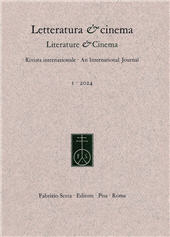Letteratura & Cinema : rivista internazionale = Literature & Cinema : an international journal
"Letteratura & cinema" è interamente dedicata alle complesse relazioni fra due arti, letteratura e cinema, alle dinamiche narrative, alle suggestioni visive che le parole degli scrittori hanno ispirato all'immaginario degli autori di cinema fin dalle origini della settima arte, in un ventaglio inesauribile e contraddittorio di adattamenti e invenzioni, infedeltà e fedeltà, alchimie e ambiguità.
Fin dai suoi esordi il cinema ha attinto dalla letteratura - si pensi ai maestri del cinema muto come Georges Méliès, David Wark Griffith, Friedrich Wilhelm Murnau, o ad autori che hanno operato anche nel sonoro come Carl Theodor Dreyer o Ernst Lubitsch, così come nelle epoche successive alcuni fra i più grandi cineasti hanno continuato a basarsi su opere letterarie, da Jean Renoir a Alfred Hitchcock, da Laurence Olivier a Orson Welles, da Michael Powell e Emeric Pressburger a Luchino Visconti, da Stanley Kubrick a François Truffaut, da Joseph Losey a Roman Polanski, da Pier Paolo Pasolini a Rainer Werner Fassbinder. Creare un film da un testo letterario (sia questo un romanzo, un racconto o una pièce teatrale) implica necessariamente trasformare, modificare, condensare e reinventare l'opera letteraria d'origine per realizzare un'opera che costituisca la sua metamorfosi in un'altra forma espressiva, quindi ne rispecchi alcune peculiarità, e al tempo stesso sia autonoma.
L'adattamento costituisce un processo di "trasferimento" da un'arte ad un'altra arte e quindi solleva le questioni della concordanza e della differenziazione: diversità delle forme narrative ed eventuali diversità tematiche. Come esiste una ricchissima filmografia che deriva la sua ispirazione dalla letteratura, così sono diventati numerosi, nell'ultimo secolo, i casi di opere letterarie (di narrativa, poesia e teatro) che hanno desunto immagini e visioni dal cinema e attualmente la dialettica fra le due arti costituisce ormai un fenomeno reciproco. "Letteratura & cinema" analizza la dialettica fra la pagina scritta e le immagini in movimento in tutte le sue declinazioni, senza trascurare quei testi “intermedi”, ma spesso caratterizzati da una loro peculiare autonomia linguistica, che sono le sceneggiature (e anche i soggetti e i trattamenti), talvolta opera di scrittori avvezzi a scrivere in funzione di una narrazione per immagini. [Testo dell'editore]
"Literature & Cinema" is entirely dedicated to the complex relationships between literature and cinema, to the narrative dynamics, to the visual suggestions that the words of the writers have inspired to the imaginary of cinema authors since the origins of the seventh art, in an inexhaustible and contradictory range of adaptations and inventions, infidelity and fidelity, alchemy and ambiguity.
From the earliest beginnings of film history, cinema has drawn on literature - think of silent film masters such as Georges Méliès, David Wark Griffith, and Friedrich Wilhelm Murnau, or of directors who also worked in sound such as Carl Theodor Dreyer or Ernst Lubitsch, just as in later eras some of the greatest filmmakers have continued to rely on literary works, from Jean Renoir to Alfred Hitchcock, from Laurence Olivier to Orson Welles, from Michael Powell and Emeric Pressburger to Luchino Visconti, from Stanley Kubrick to François Truffaut, from Joseph Losey to Roman Polanski, from Pier Paolo Pasolini to Rainer Werner Fassbinder. Creating a film from a literary text (a novel, a short story or a play) necessarily involves transforming, modifying, condensing and reinventing the original literary work in order to make a work that constitutes its metamorphosis into another form of expression, thus reflecting some of its peculiarities, and at the same time being autonomous.
Adaptation constitutes a process of "transfer" from one art to another and thus raises the issues of concordance and differentiation: diversity of narrative forms and possible thematic diversity. Just as there is a very rich filmography that derives its inspiration from literature, so have become numerous in the last century instances of literary works (of fiction, poetry and theater) that have derived images and visions from cinema, and currently the dialectic between the two arts now constitutes a reciprocal phenomenon. "Literature & Cinema" analyzes the dialectic between the written page and the moving images in all its declinations, without neglecting those texts that are “intermediate”, but often characterized by their own peculiar linguistic autonomy, that are screenplays (and also subjects and treatments), sometimes the work of writers accustomed to writing in function of a narrative for images. [Publisher's text]
-
Fascículos de la misma revista (disponibles individualmente)
-
Información
ISSN: 3034-8684
PERIODICIDAD
Annuale = Annual


